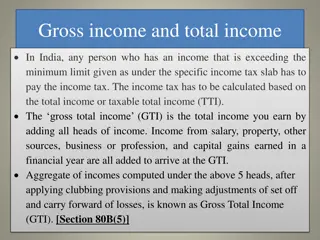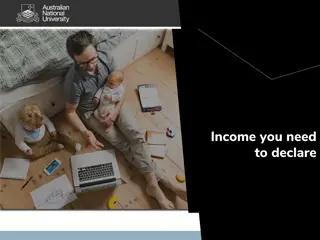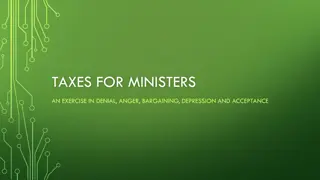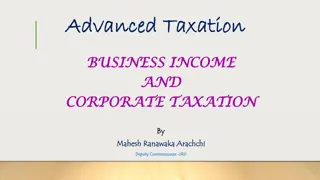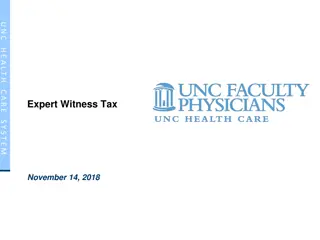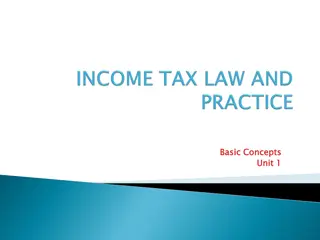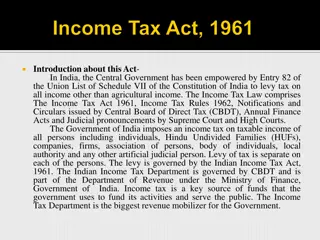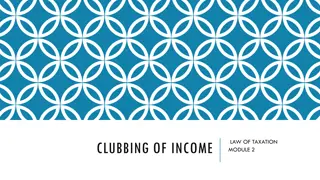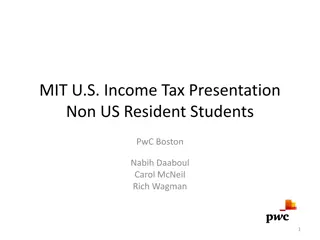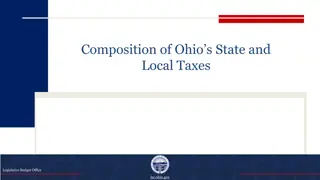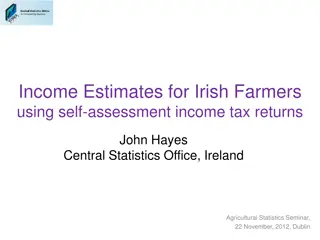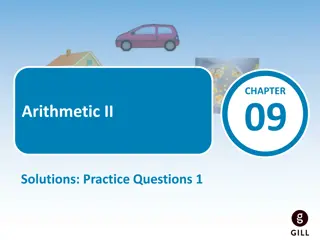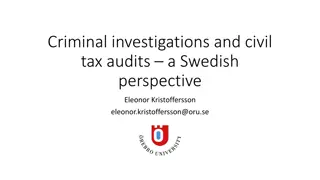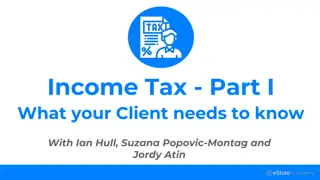Understanding Income Tax: Overview and Application
The Income Tax Act covers three modules - administration, taxes, and general provisions. It distinguishes between direct and indirect taxes, and outlines various types of taxes like income tax, VAT, and customs duty. Tax revenue funds government departments, and the taxation scheme calculates taxable income based on gross income, exemptions, and deductions. The process involves filing returns, receiving assessments, and addressing taxpayer remedies.
Download Presentation

Please find below an Image/Link to download the presentation.
The content on the website is provided AS IS for your information and personal use only. It may not be sold, licensed, or shared on other websites without obtaining consent from the author. Download presentation by click this link. If you encounter any issues during the download, it is possible that the publisher has removed the file from their server.
E N D
Presentation Transcript
Income Tax N6
Module 1 Overview of income tax OVERVIEW OF THE INCOME TAX ACT The Income Tax Act is normally amended annually during the Budget Speech in February. The Income Tax Act consists of three Modules: Module One deals with the administration of the Act; Module Two with the taxes; and Module Three with the general provisions of the Act. www.futuremanagers.com
Module 1 Overview of income tax (continued) DISTINCTION BETWEEN DIRECT AND INDIRECT TAX Direct taxes can best be described as taxes paid on the income that a person has received, such as income tax or tax paid on the salary, commission, interest or business income that a person has earned. Direct tax, on the other hand, is only levied if you enter into a transaction to acquire a service or product, such as value added tax (VAT). www.futuremanagers.com
Module 1 Overview of income tax (continued) TYPES OF TAX Taxes can be classified into various categories, such as: Income tax; Dividends tax; Estate duty; VAT; Donations tax; Customs duty; Transfer duty; Air passenger tax; and Turnover tax; Environmental levies. www.futuremanagers.com
Module 1 Overview of income tax (continued) APPLICATION OF TAX REVENUE National Government consists of a number of departments. Each of these departments has to pay employees, purchase fixed and non-fixed assets and run their department s income and expenses. The tax that citizens pay will go towards this and the running of the country and municipalities. www.futuremanagers.com
Module 1 Overview of income tax (continued) SCHEME OF TAXATION The schematic presentation of calculating taxable income is demonstrated: GROSS INCOME Less exempt income Equals INCOME Less deductions Equals TAXABLE INCOME www.futuremanagers.com
Module 1 Overview of income tax (continued) THE PROCESS OF RENDERING A RETURN, RECEIVING AN ASSESSMENT AND THE REMEDIES FOR A TAXPAYER All income (remuneration) that was received from an employer and all deductions that were made over a period of a year of assessment, will be accumulated and reflected on a form called an IRP 5 certificate. Once SARS has received the return of income (ITR12) it will issue the taxpayer with an assessment (IT34). www.futuremanagers.com
Module 1 Overview of income tax (continued) COMPLEXITY OF TAX ISSUES The South African Tax Practitioners (SAIT) body is a professional body that is dedicated to tax issues in South Africa. The members comply with the complexity of the strict qualifications and membership to the body. www.futuremanagers.com
Module 2 Personal income tax PERSONAL INCOME TAX The steps in Module one of the Income Tax Act shows the process as: Calculate taxable income. Determine normal tax per tax tables. Less rebates. Equals net normal tax Less prepaid taxes Equals tax liability. www.futuremanagers.com
Module 2 Personal income tax (continued) PERSONAL TAXABLE INCOME The different types of income that an individual taxpayer can earn can consist of: Normal earnings; Other income; Foreign income; and Capital income. www.futuremanagers.com
Module 2 Personal income tax (continued) CAPITAL AND OTHER INCOME Capital income as such is specifically excluded from the general definition of gross income, such as winnings from a Lotto draw, inheritances, the selling of your motor car and all other receipts of a capital nature. The definition of gross income ends with the proviso: but including (whether of a capital nature or not)so received or accrued as are described hereunder, namely www.futuremanagers.com
Module 2 Personal income tax (continued) THE REDUCTION PROCESS Gross income less exemptions equals income. Income less deductions is taxable income. The reduction process builds on this and explains how you start with gross income. Gross income and income are then reduced by certain exclusions which will then result in taxable income. www.futuremanagers.com
Module 3 Gross income THE GENERAL DEFINITION OF GROSS INCOME Gross income can be summarised as follows: In relation to any year or period of assessment In the case of any resident: The total amount in cash or otherwise received by or accrued to or in favour of such a resident. In the case of a person who is not a resident: The total amount in cash or otherwise received by or accrued to or in favour of from a source within, or deemed to be within the Republic. www.futuremanagers.com
Module 4 Exemptions from gross income for an individual EXEMPTIONS APPLICABLE TO GOVERNMENT EMPLOYEES OR INSTITUTIONS Section 10(1)(a): The receipts and accruals of the SA Government, National, Provincial or Local Sphere. Section 10(1)(c)(ii): Any pension payable to a person who has occupied the office of State President or Vice State President. Section 10(1)(c)(iii) and (iv): The salary of persons, who are not resident, employed as an official by a Foreign Government in South Africa. Section 10(1)(cE): The income of registered political parties. www.futuremanagers.com
Module 4 Exemptions from gross income for an individual (continued) EXEMPTIONS APPLICABLE TO INSTITUTIONS Certain exemption laws are, but are not limited to: Section 10(1)(cN): A Public Benefit Organisation as approved by the Commissioner in terms of Section 30(3) of the Act. Section 10(1)(cO): Any Recreational Club approved by the Commissioner in terms of Section 30A of the Act. Section 10(1)(d)(i): A pension fund or a beneficiary fund defined in the Pensions Act. www.futuremanagers.com
Module 4 Exemptions from gross income for an individual (continued) EXEMPTIONS APPLICABLE TO PERSONS Certain exemption laws are, but are not limited to: Section 10(1)(g) War pension. Section 10(1)(gA): Disability Pension paid under the Social Assistance Act. Section 10(1)(gB): Workmen s Compensation. Section 10(1)(gB)(iii): Compensation paid in respect of the death of an employee by an employer, where that death arises out of and in the course of his employment. www.futuremanagers.com
Module 5 Expenses of an individual ALLOWABLE EXPENSES IN TERMS OF THE GENERAL DEDUCTION FORMULA GROSS INCOME Less Exemptions = INCOME Less Deductions = TAXABLE INCOME www.futuremanagers.com
Module 5 Expenses of an individual (continued) NON-ALLOWABLE EXPENSES Section 23(a) :The cost in the maintenance of any taxpayer, his family or establishment Clothing, food, etc. will not be allowed. Section 23(b): Domestic or private expenses Transport, rental of private residence, etc. will not be allowed. www.futuremanagers.com
Module 5 Expenses of an individual (continued) OTHER ALLOWABLE EXPENSES Retirement fund contributions; and Donations. www.futuremanagers.com
Module 6 Allowances and fringe benefits INTRODUCTION Once the value of a fringe benefit is calculated, we refer to it as the cash equivalent of the fringe benefit. In other words, we refer to the cash equivalent as the amount on which a taxpayer will be taxed. This cash equivalent can be reduced by any amount that the taxpayer pays to the employer for the right to receive or use the fringe benefit. www.futuremanagers.com
Module 6 Allowances and fringe benefits (continued) SPECIFIC FRINGE BENEFITS These include: Assets acquired at less than actual value of the asset; Right of use of sundry assets; Right of use of motor vehicle; Meals, refreshments and meal vouchers and refreshment vouchers; Free or cheap services; and Benefits and subsidies in respect of interest on loans. www.futuremanagers.com
Module 6 Allowances and fringe benefits (continued) ALLOWANCES These are amounts that employers pay to employees as an advance or to refund them for expenses incurred on behalf of the employer. For example, these can be: Entertainment allowances; Travelling allowances; and Subsistence allowances. www.futuremanagers.com
Module 6 Allowances and fringe benefits (continued) SUBSTANCE ALLOWANCE This occurs where the employee has to spend at least one night away from his usual place of residence for business purposes on behalf of the employer. The employer advances an allowance to the employee to pay for incidentals and/or meals and/ or accommodation whilst the employee is away on business. www.futuremanagers.com
Module 7 Prepaid taxes THE REASON AND THE RESPONSIBILITY FOR THE PAYMENT OF PREPAID TAXES One of the main reasons is that Government needs cash to address their cash flow during the year. Employee s tax is deducted from an employee s remuneration by the employer. www.futuremanagers.com
Module 7 Prepaid taxes (continued) EMPLOYEE S TAX Employee s tax is deducted from an employee s remuneration and paid over by the employer to SARS on a monthly basis. This can be through: Pay as you earn (PAYE) - the amount of employee s tax that is calculated at year end. Remuneration - any amount of income which is paid or is payable to any person by way of any pay, salary, wage etc. www.futuremanagers.com
Module 7 Prepaid taxes (continued) PROVISIONAL TAX Provisional tax is a mechanism to pay the normal income tax liability during the tax year. Therefore, provisional tax is an advance payment of a taxpayer s normal tax liability. www.futuremanagers.com
Module 8 Retirement and resignation benefits INTRODUCTION When an employee resigns or retires from employment, an amount will be due to him in terms of the retirement fund. This amount will either be payable in terms of a pension fund or provident fund to which the employee has made contributions as a member of such a fund. www.futuremanagers.com
Module 8 Retirement and resignation benefits (continued) PENSION AND ANNUITIES RECEIVED On retirement, a member of an approved pension or retirement annuity fund must commute up to one-third of the total value of his or her interest in the fund for a single payment. An annuity is a fixed, annual amount which can be paid in a monthly or any other instalment. www.futuremanagers.com
Module 8 Retirement and resignation benefits (continued) SINGLE PAYMENTS FROM PENSION AND PROVIDENT FUNDS When it comes to the difference between the two, a person may withdraw their accumulated lump sum benefit from a pension or provident fund when they shift their employment from one employer to another before the normal specified retirement age. In the case of a retirement annuity fund one can only access the benefit at age 55 or death. www.futuremanagers.com
Module 8 Retirement and resignation benefits (continued) AMOUNTS RECEIVED UPON RETIRING FROM SERVICE All amounts received by employees from their employers upon the relinquishment, termination, loss, repudiation or variation of their employment are included in gross income. These amounts are received for services rendered and will be included in taxable income and taxed as per normal tax tables. www.futuremanagers.com
Module 9 Estates and trusts DEFINITION OF A TRUST Any trust fund consisting of cash or other assets which is administered and controlled by a person acting in his fiduciary capacity, where such person is appointed under a deed of trust or by agreement or under the will of a deceased person. www.futuremanagers.com
Module 9 Estates and trusts (continued) DEFINITION OF A DECEASED ESTATE The estate of any person shall consist of all property of that person as at the date of his death and of all deemed property of that person at date of his death. www.futuremanagers.com
Module 9 Estates and trusts (continued) DONATIONS TO MINOR CHILDREN AND THE PROCEEDS FROM SUCH DONATIONS Income from any amount donated on behalf of or to a minor child or stepchild shall be deemed to be that of the parent if any donation, disposition or settlement was made by the parent. www.futuremanagers.com
Module 10 Deductible income for a business TRADE AND ALLOWABLE DEDUCTIONS Taxpayers that are self-employed receive their income from the trade of carrying on a business. They could claim the following expenses in terms of the general deduction formula against their business income such as: Rental of premises to trade from; Purchases of trading stock; and Payment of salaries to employees; Travelling expenses. Advertising; Repairs to broken equipment; www.futuremanagers.com
Module 10 Deductible income for a business (continued) EXPENSES SPECIFICALLY ALLOWED IN TERMS OF THE INCOME TAX ACT There are a number of specific sections in the Act that will allow deductions to various taxpayers. Some of these deductions are: Legal expenses; Interest; Repairs; Depreciation; and Bad debts; Lease payments. Doubtful debts; www.futuremanagers.com
Module 10 Deductible income for a business (continued) LEGAL EXPENSES A taxpayer can claim legal expenses that he incurs for the purposes of his trade. It is not a requirement that the expenses must have been incurred in the production of income. www.futuremanagers.com
Module 10 Deductible income for a business (continued) REPAIRS V IMPROVEMENTS Repair is a restoration by renewal or replacement of part of an asset. The emphasis is on the fact that only part of the asset must have been broken or damaged. Improvement means that the income-earning capacity has increased after the asset that was damaged or broken has been restored or rather reconstructed. www.futuremanagers.com
Module 10 Deductible income for a business (continued) BAD DEBTS Conditions to be met before a bad debt qualifies as a deduction: The amount to be written off must have been due to the taxpayer It must have been included in sales for this year or a previous year of assessment. The amount must have become irrecoverable during the current year of assessment. A taxpayer has to claim the debt in the year of assessment that the debt became irrecoverable. www.futuremanagers.com
Module 10 Deductible income for a business (continued) DOUBTFUL DEBTS A deduction to a taxpayer is allowed in respect of so much of any debt due that the Commissioner considers doubtful, if that debt would have been allowed as a deduction had that debt become bad. www.futuremanagers.com
Module 10 Deductible income for a business (continued) INTEREST AND FINANCIAL CHARGES Interest or finance charges are normally charged if something is acquired on credit. The seller of the product has to settle his outstanding accounts and pay for his purchases. www.futuremanagers.com
Module 10 Deductible income for a business (continued) CAPITAL ALLOWANCES CLAIMED When a taxpayer purchases an asset, it is normally a large amount of capital that is required to invest in such assets. As these are capital assets, no deduction can be claimed in terms of the Act. The Income Tax Act allows a number of allowances on various assets to be claimed by the taxpayer, such as depreciation of machinery. www.futuremanagers.com
Module 10 Deductible income for a business (continued) LEASE AGREEMENTS When a taxpayer decides to lease a property, the first amount that needs to be paid will be the monthly rent. There are other payments that could be allowed as deductions to arrive at taxable income. These are lease premiums and leasehold. www.futuremanagers.com
Module 11 Calculation of tax for different business entities SOLE OWNER A business that is run by an individual is referred to as a sole ownership. His normal tax per tax tables will be calculated the same as for a normal individual owning remuneration. He will be entitled to deduct allowable business expenses against his business income. Once the business income is calculated, he will be allowed to deduct expenses such as retirement fund contributions and donations. www.futuremanagers.com
Module 11 Calculation of tax for different business entities (continued) PARTNERSHIPS A business partnership can consist of between 2 and 20 persons. Profit and losses are shared in a predetermined profit-sharing ratio. Although a partnership is a form of business entity, it is not a legal entity. In this case, each partner will have to declare his share of a partnership s profit or loss in his own capacity as a taxpayer. www.futuremanagers.com
Module 11 Calculation of tax for different business entities (continued) CLOSE CORPORATIONS AND COMPANIES A company or a close corporation is taxed as a legal entity in their own right. The tax rate applicable to a company or a close corporation is a fixed rate which is presently 28% of the taxable income of the entity. It is a fixed rate and no primary, secondary, tertiary or medical tax credit rebates are allowed. www.futuremanagers.com
Module 12 Farming INTRODUCTION All income derived directly from farming operations will be regarded as farming income. Income from farming activities will also include grazing fees, recoupment of wear and tear on vehicles, implements and machinery used to carry on farming operations and subsidies received by farmers, whether in respect of farm products or capital expenditure on dams. www.futuremanagers.com
Module 12 Farming (continued) FULL-TIME FARMING V PART-TIME FARMING A full-time farmer can be seen as a person who makes a livelihood from farming operations. Opposed to this is a person that is employed in another trade and only farms on a part-time basis who has a plot and only visits on weekends and sees farming as a hobby rather than a trade. www.futuremanagers.com
Module 12 Farming (continued) SIMILARITIES WITH INDIVIDUAL AND BUSINESS TAXATIONS Farmers are taxed in the same manner as any other taxpayer in terms of the provisions of the Act. There is, however, some relief granted in respect of his income from farming, in regard to, for example, the treatment of stock and capital assets. www.futuremanagers.com
Module 12 Farming (continued) TREATMENT OF LIVESTOCK AND OTHER STOCK Where a farmer has disposed of livestock on account of drought on or after 1 March 1982, and the whole or any portion of the proceeds of such disposal has been deposited into an account in the name of the farmer with the Land and Agricultural Bank of South Africa, the amount of such deposit will be deemed not to be gross income for the year of assessment. www.futuremanagers.com
Module 12 Farming (continued) LIMITATION ON THE PURCHASES OF LIVESTOCK Purchases of livestock can never exceed the farming income plus closing stock of livestock less the opening stock of livestock. The disallowed amount can be claimed in the following year. There is a provision that the disallowed amount can be deducted as purchases even if a loss is created in the case where the disallowed amount plus opening stock of livestock exceeds the market value of the closing livestock. www.futuremanagers.com




